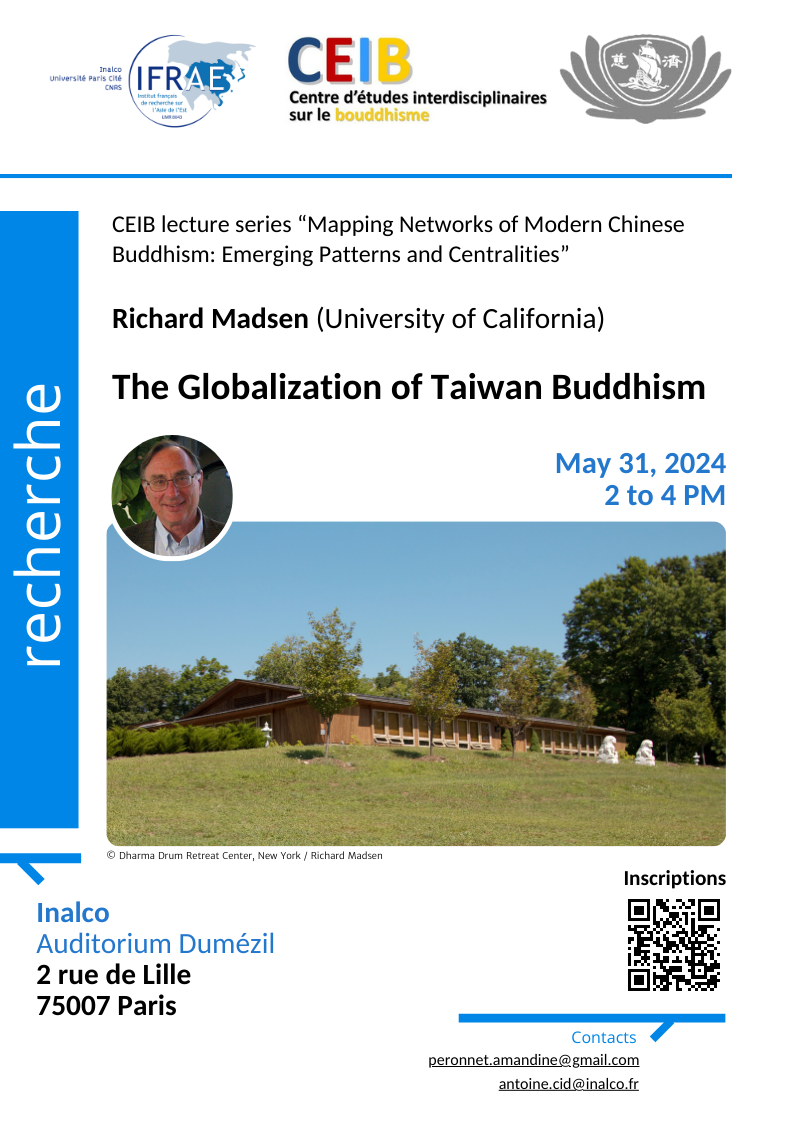Dans le cadre de son cycle de conférences “Mapping Networks of Modern Chinese Buddhism: Emerging Patterns and Centralities” 圖繪近現代漢傳佛教網絡:多模式與多中心的興起, le CEIB accueillera Richard Madsen (University of California) le vendredi 31 mai 2024. Il donnera une conférence en anglais intitulée “The Globalization of Taiwan Buddhism”.
Informations pratiques
Titre / Title : The Globalization of Taiwan Buddhism
Conférencier / Lecturer : Richard Madsen (University of California)
Financement / Funding : Buddhist Compassion Relief Tzu Chi Foundation
Date et heure / Date and Time : le vendredi 31 mai de 14h à 16h / May 31, 2 PM (Paris)
Lieu / Location : Auditorium Dumézil, Maison de la Recherche, 2 rue de Lille, 750007 Paris
Formulaire d’inscription / Registration form : https://forms.gle/KTZZLisPSsANcA228
Organisation : Amandine Péronnet, Antoine Cid

Résumé / Abstract
Taiwanese Humanistic Buddhism (or Buddhism in the human realm) predominates in Taiwan’s new middle classes, people who have prospered, as Taiwan has prospered, by embracing higher education and participating in an economy based on export of high-tech products. This has led to three forms of engagement with the modern, globalized world. The first is geographical: Middle class Chinese from Taiwan are now spread around the world in pursuit of business or professional opportunities. The second is professional: they are engaged with transnational scientific or social scientific professional networks and with the practical enterprises enabled by these professions. The third is existential: like counterparts around the world, middle class Taiwanese face the disorienting problems of meaning that come even despite material success, from loss of traditional family ties and difficulties of finding larger meaning within incomprehensibly complex, rapidly changing social and economic systems.
These different forms of engagement with modern globalization raise sets of interconnected problems. While aspiring to address the full set of problems, different humanistic Buddhist organizations start to address them by focusing on a different part of the set. Buddha’s Light Mountain strives to build modern forms of Taiwanese-Chinese community in places where the diaspora has gathered. It is a kind of community built on reverence toward an imagined Chinese cultural tradition which nonetheless through hospitality and educational programs is extremely open to engaging with outsiders. Tzu-chi – Buddhist Compassionate Relief Society – strives to connect with modern NGOs to bring modern medical care and social services to people of all religions and cultures suffering from the multiple natural and human made disasters of the modern world. Dharma Drum Mountain seeks to address the pervasive existential anxiety by promoting the practice of Chan in a way that can accommodate the life-styles of seekers from all cultures and traditions.
These different approaches each pose distinctive sets of challenges for the organization. One challenge is cultural. The Buddhism of each organization is embedded in a Chinese cultural tradition which has been shaped by its particular localization in Taiwan. But each needs to transcend that culture, without losing it completely. The different approaches lead to different ways of doing this and different patterns of success and failure. Another challenge is social. Each has to maintain its distinctive identity while carrying out a wide variety of enterprises over great distances in a very complicated world. Should they create a centralized organization to ensure uniformity? How centralized and maintained by what kind of authority? Or should they rely on a decentralized way of propagating their dharma? If so, how to avoid becoming completely diffuse?
Each approach helps to build and relies upon distinctive forms of social networks, ranging from more closed forms with relatively deep ties among people who share many common experiences to more open, ramifying forms with people who have little direct knowledge of each other. Each of these forms is challenged as the organizations grow in size and complexity in the course of engaging with global modernity. Each organization has to try different “skillful means” to maintain or to move away from its balance of closed and open networks.
| Richard Madsen is a distinguished Professor of Sociology the University of California, San Diego and was a co-director of a Ford Foundation project to help revive the academic discipline of sociology in China. Professor Madsen is the author, or co-author of twelve books on Chinese culture, American culture, and international relations. He has also written scholarly articles on how to compare cultures and how to facilitate dialogue among them. |

Laisser un commentaire